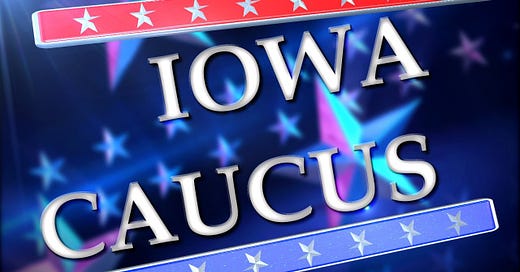Iowa's icy conditions may foreshadow a worsening scenario for Democrats, establishment figures, and the 'woke' community.
Trump's victory in Iowa was not just a win; it was a historic landslide. Securing the state for the third time in the caucuses, Trump's 51% margin is unprecedented, decisively paving his path back to Washington.
The "Trump Train" has transformed into an unstoppable force, intensifying fears among Democrats and establishment groups.
His triumph after the caucus has elevated concerns among Democrats and 'woke' ideology proponents, who now face a heightened sense of urgency.
This outcome not only cements Trump's strong influence within the GOP but also casts doubt on the prospects of alternative Republican candidates, especially Nikki Haley.
Trump's ability to rally his base and attract a broad spectrum of Republican voters poses a significant threat to Democrats' progressive aspirations.
Under Trump's administration, policies clashed with 'woke' values.
Trump’s Iowa victory heightens anxiety about a potential return to office and the reversal of progress in social justice, environmental protection, and immigration reform.
The Democrats face a strategic challenge - countering Trump's populist appeal while appealing to both the progressive base and moderate and swing voters.
Finding this balance is crucial for the party's success.
Nikki Haley, a potential Republican contender, continues to generate mixed opinions and emotions.
Haley is a candidate that is not only a divisive figure but not well liked.
Within the Party, there are those who may Haley may appeal to within the GOP, but to the majority of Republican voters, Haley is not a viable option.
Haley simply isn’t Donald Trump.
Chris Christie's candid assessment of Haley's capabilities in the recent infamous hot mic incident, echoes doubt about her viability against Trump's dominance, and her constant shifting stances, particularly towards Trump, raise questions about her political integrity and ability to offer a clear alternative to Trump's agenda.
While Haley's credentials as a governor and diplomat are noteworthy, her moderate positions struggle to resonate with the GOP's conservative base, loyal to Trump. Her chances of energising a significant portion of the Republican electorate remain uncertain.
Trump's presence is akin to a 'force majeure' in political terms—a unique and formidable phenomenon.
But Haley's mixed record as governor and ambassador is problematic. It exposes her to criticism from both sides of the political divide.
As the GOP primary unfolds with Trump leading decisively, the Party’s quandary now is it must choose between showing an allegiance to Trump or exploring a new direction.
But for Trump however, his Iowa victory solidifies his frontrunner position status and challenges the GOP to consider alternatives – and Haley is unlikely to be that alternative.
Trump's overwhelmingly profound influence within the party and the discussions following the Iowa caucus represent a critical moment in American politics.
His victory has energised his enormous supporter base, and it is also attracting disillusioned Democrat voters to signal their intent of voting for Trump – alarming his opponents and setting the stage for a contentious election.
Democrats and 'woke' activists are now on high alert, and the Trump mania can only expect to grow and deepen.
The challenge for them now is what type of strategy can they devise to counter Trump's appeal and address the concerns of a diverse electorate.
The Republican Party’s dilemma is do they maintain loyalty to Trump or seek a new path?
The decisions made by both parties in this rapidly changing political landscape will significantly impact the United States' future.
Either way, the Trump train has left the station and it’s heading straight to Washington.




